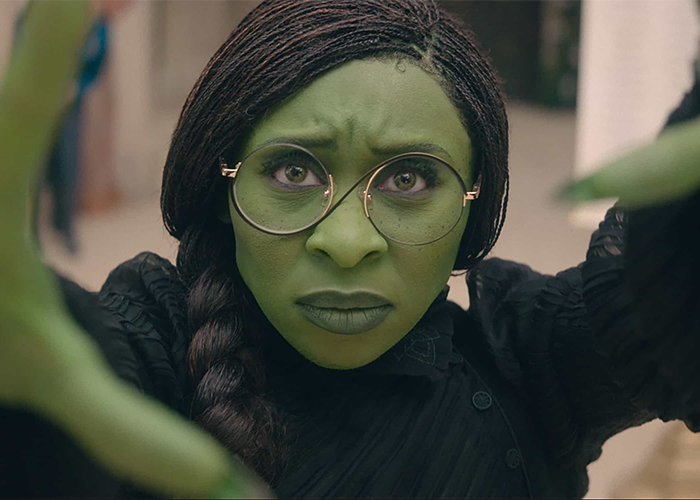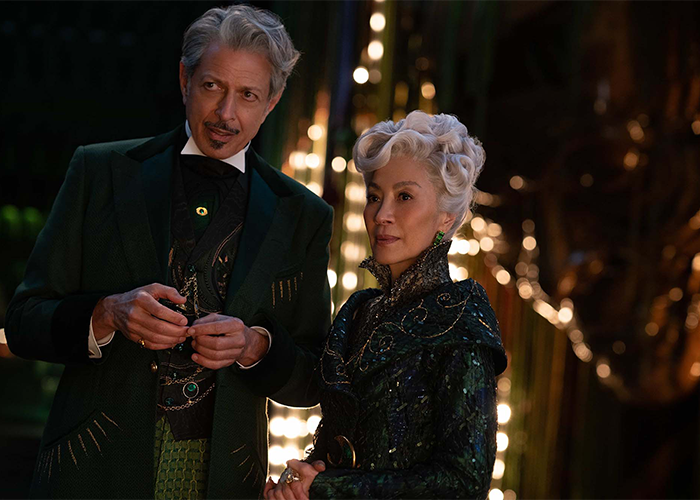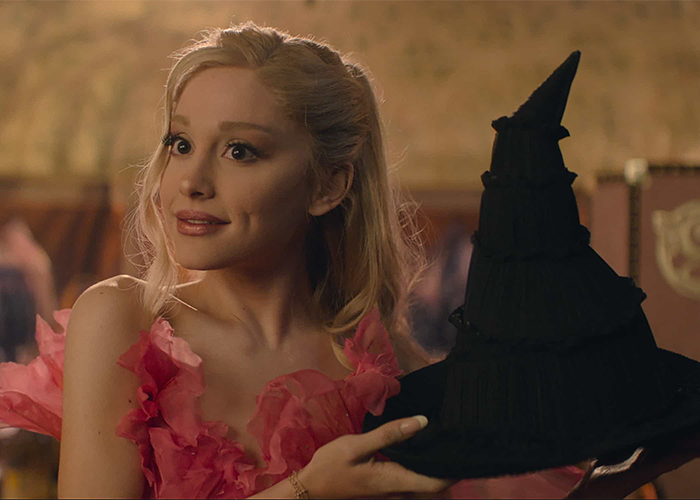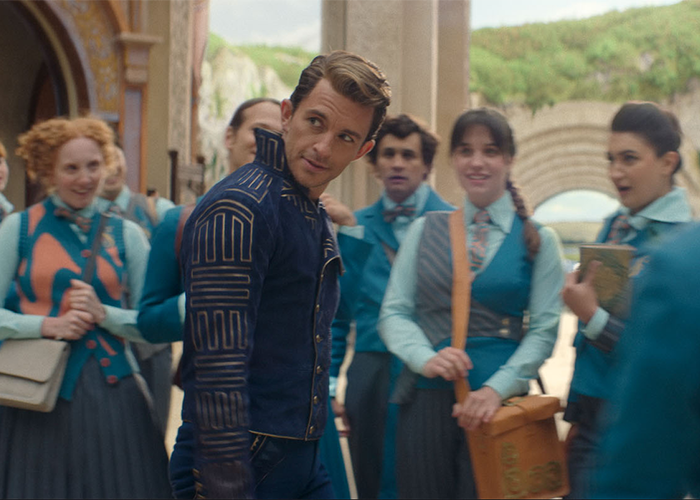REVIEW: ‘Wicked’ is one of the few movie musicals to get it right
It’s easy to assume that the recent trend of making movies out of existing intellectual property—from Barbie to Avatar: The Way of Water — is a painless cash grab. After all, now that moviegoers are going to cinemas less, industry executives are more likely to greenlight projects with an already built-in audience.
This, of course, has its risks too. The more passionate the fanbase, the harder they are to please. Movie musicals are notorious for this. Memes of Dear Evan Hansen (2021) were more well-received than the film. Mean Girls (2024) had fans reminiscing about its Tony-nominated Broadway counterpart. Even Swifties, known for having an encyclopedic knowledge of Taylor Swift’s career, pretend Cats (2019) don’t exist.
The daunting task

The stakes are even higher for Wicked, the second-highest-grossing Broadway show of all time (behind The Lion King) and frankly one of the most iconic musicals of our time. The movie adaptation, coming to cinemas on Nov. 20, is the first attempt to translate the story for the big screen. It took 20 years to make—Marc Platt and David Stone, producers of both the Broadway show and the film, admitted it was a daunting task.
Wicked first came to Broadway in 2003 as a prequel to Wizard of Oz. It paints Elphaba (originated by Idina Menzel, played by Cynthia Erivo in the film), the previously nameless Wicked Witch of the West, as a misunderstood young girl. It also builds an unlikely friendship between her and Glinda the Good (originated by Kristin Chenoweth, played by Ariana Grande in the film), imagining them as roommates at Oz’s Shiz University.
Longtime fans will be relieved to know that, from the first scene, it’s clear the film adaptation was a labor of love, and every person behind it wanted to honor the source material. Director Jon M. Chu (Crazy Rich Asians, In The Heights) understands that the musical is untouchable; it’s largely why the movies are split into two, following the show’s two-act structure, with the sequel coming out next year. The dialogue is nearly verbatim, and the only creative liberties the movie employed are expansions, never omissions.

These additions include Elphaba’s experiences being bullied as a child because of her green skin, her relationship with her sister Nessarose (Marissa Bode), and her private sorcery lessons with Madame Morrible (Michelle Yeoh)—all scenes that allow audiences to grapple with the complexities of the characters and make the story richer. Songs like Popular and Dancing Through Life are also extended to make space for storytelling and grander production. Wicked isn’t just faithful to the original story, but head-over-heels in love with it.
It helps that some of the minds who brought the story to Broadway worked on the film too. Aside from Marc Platt and David Stone, Stephen Schwartz also produced and worked on music with Oscar-nominated composer John Powell; while the screenplay was written by Dana Fox and Winnie Holzman, the latter of which wrote the book (musical theater lingo for “script”) for the stage musical.
Defying gravity—and expectations
Erivo as Elphaba is magnetic. The actress, who has won an Emmy, Grammy, and Tony, and has been nominated for an Oscar, offers a more subdued iteration of the character. While viewers who grew to love Menzel’s take on Broadway may doubt this choice, it perfectly aligns with what the film tries to achieve: a deeper look into the emotional landscapes of these beloved characters. We sit with Elphaba in these moments of quiet and feel her loneliness and isolation through the screen. Erivo’s Defying Gravity is a powerhouse performance serving as Elphaba’s cathartic release; while Erivo's voice is strong throughout the film, Defying Gravity is deservedly the highlight.

Grande’s casting as the bubbly Glinda attracted its share of criticism. Many said it reeked of stunt casting, especially considering Grande has never starred in a feature of this magnitude. But she quickly steals the scene in Wicked, perfecting the hair flips and Glinda-isms that make the character so lovable. Like Chenoweth who originated the character on Broadway, Grande had the challenge of showing glimpses of Glinda’s inner world without losing her ditzy, self-centered facade, and she easily succeeds. Her comedic timing is impeccable; her most famous acting credit, after all, is the similarly silly Cat Valentine on Nickelodeon’s Victorious. Her voice makes Popular and What Is This Feeling? sparkle, and her turns in Defying Gravity pack a heartbreaking punch. I can imagine a near future where kids will know Grande as Glinda before they realize she’s a pop star—that’s how much she embodies the character.
The rest of the cast glows in their own ways. Jeff Goldblum as the Wizard effectively toys with the character’s moral grayness, and Tony nominee Ethan Slater gives a surprising depth to the relatively small role of Boq. The film is made livelier upon Jonathan Bailey’s entrance as the mischievous prince Fiyero.
A visual delight
The film’s lighting and color also seemed the primary concern of many viewers when the movie trailer was first released; for good reason too, given Hollywood blockbusters’ penchant for muddy cinematography. But frankly, the colors were fine—it was gorgeous at best, overcast at worst.
The pinks and greens also light up in moments that matter. When Elphaba is first assigned to be roommates with Glinda, the latter's lamps cast pink light on the former’s green skin. When Glinda dances with Elphaba at a pivotal scene marking the start of their friendship, their proximity radiates a green glow in Glinda’s skin and blonde hair.
Director Chu favored practical effects for the film, planting around nine million tulips and building life-sized buildings and a 16-ton Emerald City train, which translated beautifully in key scenes. This, again, comes from Chu’s reverie for the source material. He told Vanity Fair that he understood not everyone is given the chance to build their rendition of the Oz, and he wanted to “do it the way (he) dreamed about as a kid.”

Of course, there is no doubt the stage musical will always be more monumental. There is a scene in Emerald City that theater fans will adore, but it’s one that, for a moment, pulls us out of the movie’s trance and reminds us of how good the stage musical is. This doesn’t mean the movie failed or should not exist. In fact, it’s one of the few adaptations that expertly leverages the medium of film to enrich the world of its source material, essentially telling the story in a different language and unearthing more meanings in the process.
And simply, it is just so joyful to watch. It’s joyful to see the songs in film, where characters can change locations and costumes, and the camera can fly around and play with our perspective. It’s joyful to remember that the story continues next year, reportedly including two new songs penned by Broadway’s Schwartz. It’s joyful to witness a story made so thoughtfully, helmed by people who care about it very much.
***
'Wicked' is showing in cinemas nationwide on Nov. 20, 2024.


